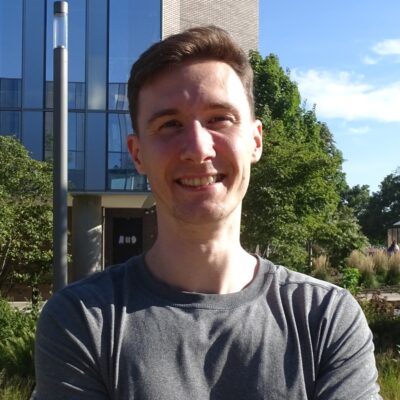Postdoc Spotlight: Andrew Orkney

September 20, 2024
Andrew Orkney is a postdoc in the department of biomedical sciences focusing on animal evolution from Hook, Hampshire, England. He holds a Ph.D. from the University of Oxford in the U.K., and his research focuses on patterns of evolution in birds and bats. He is a recipient of a Postdoc Achievement Award for Excellence in Mentoring as part of Cornell’s celebration of National Postdoc Appreciation Week 2024.
What is your area of research, scholarship, or work and why is it important?
Many evolutionary biologists investigate animal adaptations that optimise performance, exploring how animal bodies are shaped by environmental selection. I investigate the opposite; how do inherent limitations restrict adaptation and how do evolving animal lineages circumvent or overcome these challenges? I focus on patterns of evolution in birds and bats as model systems, exploring changes in their skeletal proportions over tens of millions of years, by comparing measurements I collect across hundreds of living species. I seek to understand how restrictions imposed on their skeletal evolution by fundamental mechanical rules, growth, and development may constrain adaptation, explaining their evolutionary histories and existing biodiversity.
What are the broader implications of this research, scholarship, or work?
This work provides deeper insights into the processes of animal evolution that have shaped the history of life on Earth and ultimately our own origins. Further work I am undertaking will explore the nature and significance of differences in shape between male and female animals, investigating one of the fundamental dualities ancestral to all back-boned creatures. I am also interested in examining the occurrence of developmental disorders in birds and bats, to better understand the nature of hereditary disease, and how these individual differences may be re-purposed as an evolutionary inventory to explore new adaptations.
What does receiving a Postdoc Achievement Award mean to you?
The recognition and support this award represents from Cornell University, my working group, and mentees—who I view as colleagues in my research and who are responsible for much of the most inventive thinking—is heart-warming. Further, receipt of this award will help me in my ambition to progress beyond postdoctoral research and secure a faculty position where I can deepen and extend my teaching practice.
What hobbies or activities do you enjoy in your spare time?
I enjoy exercise, running, and hiking. It is easy to forget the importance of our whole bodies in intellectual careers that place pre-eminent value on our brains. Physical activity reconnects us with our wider core needs and reminds us that we’re animals. Ithaca is a fantastic location for those activities, especially as the fall days approach. I also make a variety of animal themed art.
Why did you choose Cornell?
I initially came to Cornell almost by accident. I knew I wanted to work with Professor Brandon P. Hedrick, because of his established research and creative thinking about bat evolution, but when I first began collaborating with him he was actually in Louisiana and I was still living in England. Brandon asked me to come and work in his new lab when he moved to Cornell. I was elated at the opportunity to move to the U.S., especially such a beautiful location with a fervent intellectual atmosphere and a friendly community.
What is next for you?
I am currently seeking faculty positions and applying for further research funding to support my aims to investigate the evolution of sexual differences across birds and bats. Ultimately, I want to progress to a position where I can enjoy a mixture of teaching, mentoring, and original research. I am especially looking forward to facilitating new independent research projects for students and hearing their imaginative ideas about biology.
Do you have any advice for current graduate students?
My Ph.D. was in Arctic plankton ecology and satellite photography, a different world to my current research in animal evolution. While I enjoyed my Ph.D. immensely, I realised I was really meant to be an animal researcher at a relatively late stage in my academic journey. I want to encourage other graduate students to be the most authentic versions of themselves. Often the most difficult barriers to joy in our lives exist inside our heads, but we are fortunate that this is where we have the greatest agency to take action.
